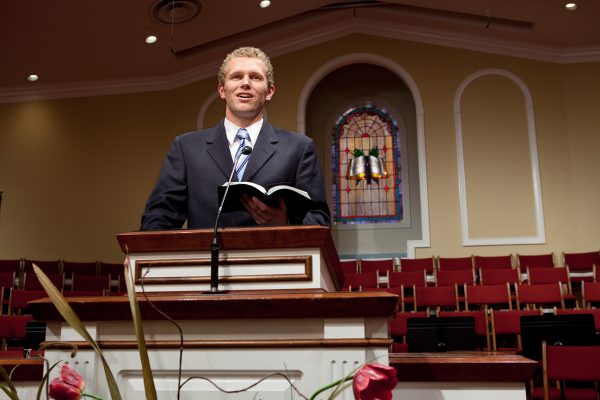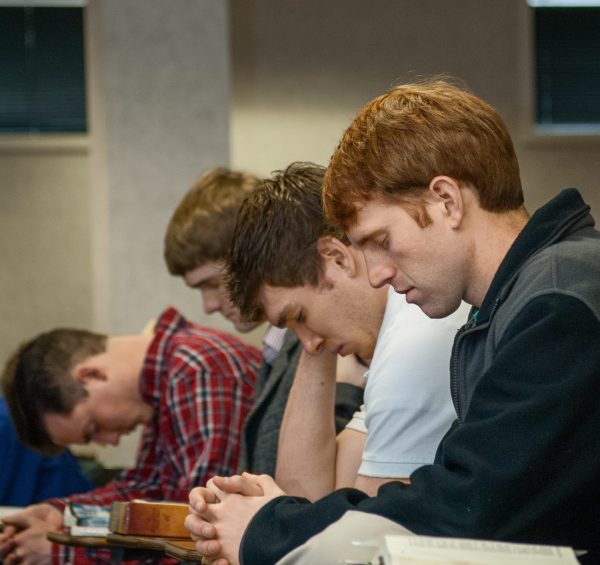It was in middle school that I first began to think that God wanted me to serve him in some kind of ministry. I had no specific idea regarding how to pursue this sense, and the idea of preparing in a formal sense certainly wasn’t on my mind.
By the time I graduated from high school, I had given far more thought to where I would study than what I would study (my dad sent me to visit five different colleges). Once I decided to enroll at BJU, choosing a major was almost an afterthought. I didn’t know what to choose, and I wanted to sample a lot of options, so I majored in Humanities.
However, I always felt like I was leaving “money on the table” if I didn’t take as many credits as possible (without increasing my tuition bill), so I regularly enrolled in a variety of extra electives, among them additional Bible and speech classes: Poetic Books, 1 Corinthians, Persuasion and even Pulpit Speech.
I don’t think I could have realized it at the time, but the Lord was shaping my interests and guiding my opportunities in ways that I could never have orchestrated. I didn’t know where I was going, but between classes, sports, music and a jumble of other activities, I had a great (and somewhat chaotic) undergraduate experience.
Through a sequence of events too involved to rehearse, in the spring of 1994 I enrolled in the MDiv program in BJU Seminary. After that one term, I was out of money and options for continuing, but I applied for and was hired to teach En 101 and 102 as a graduate assistant. This job made it possible for me to finish the next four years of graduate work at the Seminary.
Looking back, my path to the ministry was not as direct as others. I certainly had no flow chart of possible professions. However, I am amazed at how God guided my education—in all its stages and forms—to make it possible to do what He has called me to do for the last 20 years, both here at BJU and in my local church.
I believe that the Lord calls people to the ministry in a wide variety of ways and through a wide variety of paths. And although God wants your heart above all things, it’s easy—and not uncommon—to wonder: If what God wants most is a willing heart, isn’t that enough? Why spend time on education?
One of Paul’s best-known instructions to Timothy dealt with his personal discipline and effort in correctly understanding God’s word: “Study to shew thyself approved unto God, a workman that needeth not to be ashamed, rightly dividing the word of truth” (2 Tim. 2:15).
The fact that God’s word is truth doesn’t mean that everyone who handles it does so correctly. Paul knew this personally—he was extremely well-trained in the Scriptures before his conversion, and yet he had been entirely ignorant of his own Scriptures and of the Messiah they pointed to. After his conversion, he did more than just evangelize. In Ephesus—one of the few places where he settled for any length of time—he established a school.
For a young person entering the ministry, the skills, content mastery and discipline to study and to teach God’s Word are essential. And very often, a formal education—going to school—can make it possible to develop in those areas in ways that would be difficult otherwise.
For me, the two greatest values that I gained from my formal education in Bible (in both undergraduate and graduate school) have been the ability to study the Bible in the original languages and the ability to read the Bible.
This value of latter ability—reading the Bible—may seem odd at first. (Why study to do something that I’ve been able to do since first grade?) However, as I continue to teach, I’ve learned that I need the ability to read Scripture both for its microscopic as well as its macroscopic meaning.
By the microscopic reading of Scripture, I mean the kind of analysis that is made possible by the study of the Bible’s original languages: understanding the usage of Greek tenses, the forms of Hebrew verbs and how to do a word study in the original languages. The ability to use these skills and others sheds important light on the study of God’s Word, and I learned these skills in classes. It would have been difficult if not impossible for me to learn them otherwise, I believe, even with all the excellent study tools that are available today.
By the macroscopic reading of Scripture, I mean the kind of understanding that comes from reading the Bible as it was intended to be read: finding the theme within a narrative, following the flow of thought in a theological discourse or enjoying the beauty and power of divinely-inspired poetry. There were specific courses—both undergraduate and graduate—that contributed to my ability to see the whole of a line of thought, even as I was reading only one part. The work required in courses such as Old and New Testament Theology, Prophets, Systematic Theology and History of Doctrine put ideas and concepts on my radar screen as I read. I was able to make more connections and notice more in Scripture because of the unique value I got from studying for those courses.
Both of these methods build on each other, and I believe that they are one of the ways that God provides the wisdom that makes it possible to follow Paul’s next statement to Timothy: “Shun profane and vain babblings: for they will increase unto more ungodliness” (2 Tim. 2:16).
For a young person entering the ministry, the skills and discipline to study God’s Word are essential. The practice of these nurture the wisdom we need to know when God’s Word is being used correctly or incorrectly.
Gaining the skills and knowledge to serve the Great Shepherd by being a good shepherd can involve hard work and significant time. The diligence associated with careful study often excludes other good activities. But the calling is high, the rewards are great, and the privilege of serving as ambassadors for Christ requires us to give nothing less than our best efforts to the King of Kings and Lord of Lords, our Savior the Lord Jesus Christ.
This post was originally published on the CGO blog.








